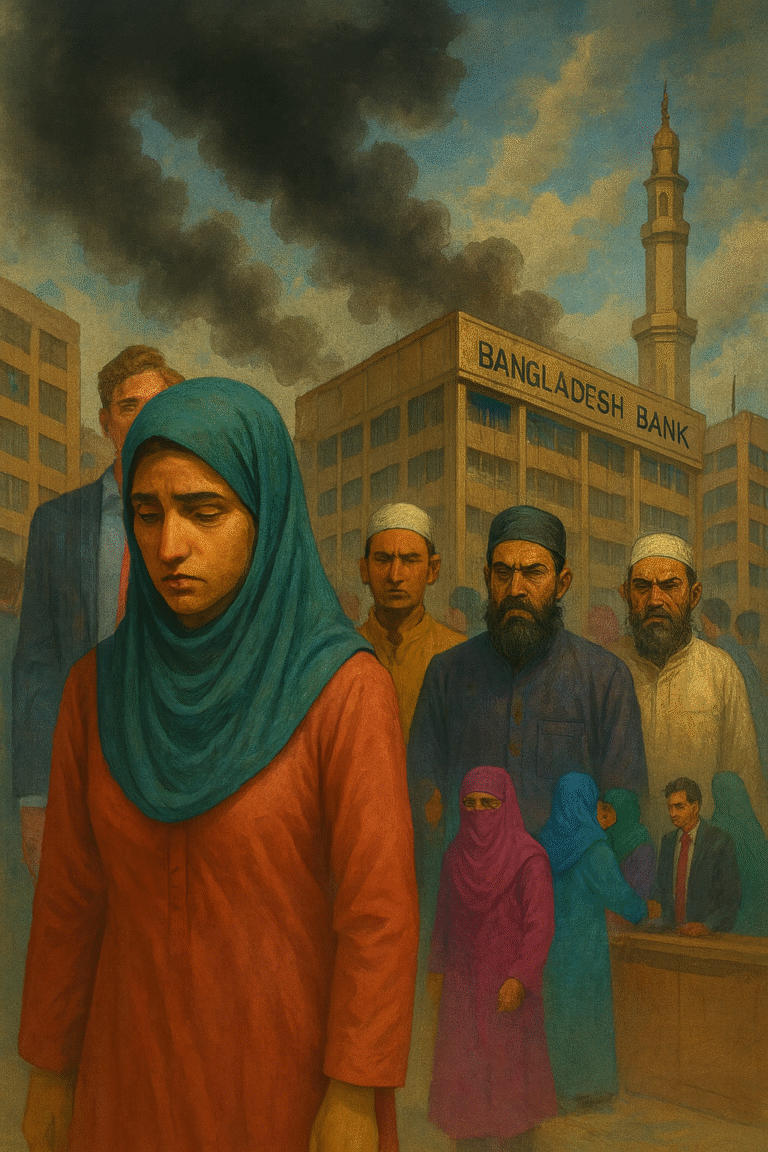Bangladesh at the Crossroads of Betrayal: When the Nation of Martyrs Kneels Before the Traitors of 1971
by Imran Chowdhury BEM
Fifty-four years after our independence, Bangladesh stands at a precipice that chills the soul of every true freedom fighter and patriot. A nation born from the ashes of genocide and the blood of martyrs—aland baptised by the sacrifices of millions—now finds itself slipping, slowly but steadily, into the hands of the very forces we fought to eradicate in 1971. The Razakars, Al-Badr, Al-Shams, Jamaat-e-Islami, and their modern-day ideological cousins—the Wahhabis, Deobandis, Muslim Brotherhood offshoots, and radicalised clerics of the waz mahfil culture—have crawled out of the sewers of history and reclaimed the stage. Their poisonous sermons pollute our mosques, their rhetoric floods our social media, and their silent influence seeps into the veins of our institutions—the armed forces, intelligence agencies, and even the judiciary.
How did we arrive here?
The Seeds of Betrayal
The betrayal did not happen overnight. It began almost immediately after 1975, when the bullets that killed the Father of the Nation also pierced the soul of the Republic. That single event opened the floodgates for the repatriated Pakistani officers, Islamist collaborators, and opportunistic elites to hijack the very spirit of the Liberation War. The freedom fighter officers who bled for this country were sidelined, retired early, or branded as “leftists” and “troublemakers.” The Pakistan-trained clique, who had once pledged loyalty to Yahya Khan, re-emerged in uniforms and bureaucracy, rewriting history and erasing the secular and socialist ideals of 1971.
Jamaat-e-Islami, banned for war crimes, returned under the political patronage of military dictators who needed a “religious cloak” to legitimise their illegitimate regimes. Ziaur Rahman, and later Ershad, played this dangerous game—embedding Islamism into the constitution, turning religion into state policy, and granting political amnesty to war criminals in the name of “national unity.” What began as a tactical compromise became a moral suicide.
The Institutional Rot
Where were the guardians of the Republic?
The government—elected or otherwise—always found it convenient to flirt with religion for power. Intelligence agencies, supposed to be the custodians of national security, became pawns of political masters. The Directorate General of Forces Intelligence (DGFI), once tasked with protecting the nation from foreign threats, became a domestic manipulator—manufacturing cases, monitoring opposition, and silencing dissent while turning a blind eye to the Islamist infiltration in universities, mosques, and even within its own ranks.
The police, often corrupt and underpaid, learned quickly that allegiance to the ruling power pays better than allegiance to the state. The bureaucracy, addicted to perks and privileges, surrendered to the political wind. The so-called “deep state”—an unholy alliance of intelligence officers, bureaucrats, businessmen, and opportunistic politicians—learned to coexist with Islamism, feeding it when needed, suppressing it when threatened, but never eradicating it.
Even the army, once seen as the symbol of national pride and professionalism, has not remained immune. The Pakistani legacy of power politics, arrogance, and ideological manipulation continues to haunt its corridors. Over the decades, subtle Wahhabi influences crept into cantonments through preachers, welfare foundations, and selective appointments. Young officers, instead of learning from the spirit of the Mukti Bahini, are often exposed to revisionist narratives—glorifying “Islamic brotherhood” over the secular nationalism that gave birth to Bangladesh. The radicals who whisper the name of the Prophet louder than the name of the Republic have started to shape minds inside the force.
The Rise of the Clerical Mob
Meanwhile, a new phenomenon has emerged in the streets—the waz mahfil preachers, the televangelists of intolerance. With loudspeakers and Facebook pages, they preach medieval hatred wrapped in melodrama and Quranic misquotation. Their followers multiply daily, hypnotised by rhetoric that glorifies Arab identity over Bengali heritage. These preachers have done what the Pakistan Army failed to do in 1971 — they’ve made the Bengali youth ashamed of their language, culture, and secular identity.
And where are the regulators, the information ministry, the ulema boards, and the home ministry? Where is the Bangladesh Telecommunication Regulatory Commission that blocks dissenting websites overnight but allows hate-filled sermons to stream unchecked? The silence is deafening—and revealing. When power depends on appeasing the mosque rather than the Constitution, the cleric becomes king.
The Moral Collapse
This descent is not merely political—it’s moral. The very institutions that were built to protect the spirit of 1971 have betrayed it. The martyrs who fell at Dhaka University, at Shamshernagar, at Kalurghat, and at Kushtia—their sacrifice is now mocked by those who stand at pulpits and call the Liberation War a “civil conflict between Muslims.” The women who were raped by the Pakistani Army and their Razakar collaborators are now dismissed as “controversial” by clerics who claim “modesty” is more important than justice.
Our textbooks have been rewritten, our monuments vandalised, our history diluted. The younger generation, fed on a diet of religious populism and historical amnesia, now sees Razakars as “misguided brothers” and secularism as “anti-Islam.”
Did No One Know?
Did the intelligence agencies not see this coming?
Did the military not detect the radicalisation creeping through mosques built in cantonments?
Did the universities not notice the growing influence of Islami Chhatra Shibir and Tablighi Jamaat networks?
Did the politicians not hear the sermons that called for Sharia rule?
They all knew. They all chose silence.
Some were bribed. Some were blackmailed. Most were complicit.
The rot spread because those entrusted with protecting the Republic preferred comfort over courage, luxury over loyalty, and power over patriotism.
The Final Betrayal
Today, as social media celebrates Razakar grandsons as “religious influencers,” and as ministers bend their knees before radical preachers for electoral blessings, one wonders: Is this the same Bangladesh we fought for?
We have reached the grotesque irony where freedom fighters are demonised as “atheists,” and Razakars are called “Islamic scholars.” Where those who fought for secular democracy are silenced by blasphemy mobs, and those who sided with the killers of 1971 are now writing our moral code.
This is not just political failure—it’s a civilizational betrayal.
Who to Blame?
Everyone—and no one.
Every government that bartered secularism for votes.
Every general who preferred personal comfort over institutional purity.
Every bureaucrat who looked away.
Every cleric who twisted faith into fanaticism.
Every citizen who chose silence over resistance.
The blood of our martyrs, the tears of our raped mothers, and the shattered dreams of a secular Bangladesh—all cry out from their graves. They ask, “Was it for this we fought?”
If Bangladesh truly falls to these Islamist jackals, history will not forgive us. The Liberation War will have been in vain. The red-green flag will remain, but its meaning will rot from within—a symbol hijacked, a nation betrayed, a revolution undone.
The time for mourning is over.
The time for reckoning has come.
“Those who forget why they fought will one day kneel before those they fought against.”
And that is precisely where Bangladesh stands today—kneeling before its own betrayers.



